Ethiopia is set to hold elections in a month, but with war in the north, ethnic violence elsewhere and major logistical hurdles, the path to credible polls is littered with obstacles.
When Prime Minister Abiy Ahmed came to power three years ago, he promised to break from Ethiopia’s authoritarian past and hold the most democratic elections the country has ever seen.
But the Nobel Peace Prize laureate is fighting crises on multiple fronts as the nation of 110 million people prepares to choose national and regional parliamentarians on June 5.
The MPs elect the prime minister, who is head of government, as well as the president — a largely ceremonial role.
A six-month-old war in Ethiopia’s northern Tigray region is the most high-profile of several security crises that will make voting impossible in large swathes of the country.
Meanwhile voter registration is hampered by logistical issues and prominent opposition parties are planning to boycott, complaining their candidates have been arrested and their offices vandalised.
“There is a broad acknowledgement that these elections won’t be perfect, to say the least — that there will be shortcomings, there will be grounds for criticism and for a lot of improvement,” a Western diplomat said.
The ruling coalition that preceded Abiy claimed staggering majorities in the two previous elections, which observers said fell far short of international standards for fairness.
A more open contest in 2005 saw big gains for the opposition but led to a lethal crackdown on protests over contested results.
– Democratic ‘resurrection’ –
In his Orthodox Easter message over the weekend, Abiy insisted this year’s elections would be “one of the chapters of Ethiopia’s resurrection.”
After an era of “darkness and turmoil, thorns and thistles, pain and death… we have reached the top of the mountain where the light is shining, carrying the hope of democracy for our country,” he said.
Some in the opposition, like the leader of the Ezema party Berhanu Nega, believe Abiy understands “there is no peace to be had when a government is in power without any popular legitimacy”.
However he told AFP that “in countries such as ours, there is no guarantee that it will not be the same as the past.”
Critics like opposition leader Merera Gudina, whose Oromo Federalist Congress is boycotting the vote, have dismissed it as a farce.
“In many ways we are probably heading for a very serious rupture in this country’s politics,” said Merera.
– Sign-up snags –
Ethiopia’s election was planned for last August, but delayed due to the coronavirus pandemic.
Even in the best of times, organising smooth elections is a tall order in the vast nation, hobbled by poor infrastructure.
Diplomats closely following the process also say the electoral board is sorely missing logistical support usually provided by the military, which is largely tied up in Tigray battling forces aligned with the region’s former rulers, the Tigray People’s Liberation Front (TPLF).
In mid-April, electoral board chair Birtukan Mideksa announced that only around half the country’s 50,000 polling stations were operational, and that two regions — Afar and Somali — had no functional stations at all.
She also sounded the alarm about lagging voter registration, saying a mere 200,000 people had signed up in Addis Ababa, a city of five million.
In recent weeks Abiy has tried to get preparations back on track, holding meetings with election officials and leaders from Ethiopia’s 10 semi-autonomous regions while publicly urging Ethiopians to register.
On the streets of Addis Ababa, though, there have been few signs of campaigning beyond sporadic rallies and scattered banners for Abiy’s Prosperity Party, featuring a lightbulb symbolising a brighter future.
– ‘Ethiopia decides’ –
The Prosperity Party’s other main image is a pair of hands holding up three leaping figures — one blue, one yellow, one red — radiating waves of light.
It is meant to represent harmony among Ethiopia’s diverse population.
But it belies the violence that has roiled Ethiopia under Abiy, threatening to imperil balloting.
Beyond Tigray, the electoral board chair Birtukan has highlighted hotspots of ethnic killings that have forced the election body to suspend activities, including in the country’s most populous regions, Oromia and Amhara.
Hundreds have been killed since March in attacks in Amhara, sparking protests in many of the region’s cities.
The European Union said this week it would not send observers to the polls, citing a failure to reach an agreement with the government on basic issues like communications and the observers’ independence.
Abiy’s government nonetheless seems determined to forge ahead.
“On June 5, #Ethiopia decides,” Abiy’s press secretary Billene Seyoum wrote last week on Twitter.
“As imperfect as it may seem, the country’s path of democratization can only be defined (and) determined by its people.”








































admin in: How the Muslim Brotherhood betrayed Saudi Arabia?
Great article with insight ...
https://www.viagrapascherfr.com/achat-sildenafil-pfizer-tarif/ in: Cross-region cooperation between anti-terrorism agencies needed
Hello there, just became aware of your blog through Google, and found ...